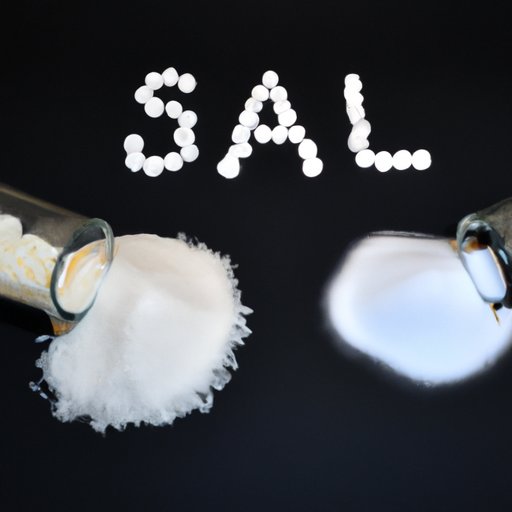An Overview of Sodium as a Mineral
Sodium is an essential mineral that plays an important role in our diets, our environment, and our overall health. While it is often associated with negative health effects due to its high levels in processed foods, sodium is an important nutrient that can provide numerous benefits when consumed in moderation. In this article, we will explore the definition, properties, and uses of sodium, as well as its effects on our health and its sources in our environment.
Definition of Sodium
Sodium is a chemical element found on the periodic table with the symbol Na and atomic number 11. It is an alkali metal and is the sixth most abundant element in the Earth’s crust. Sodium is a soft, silvery-white metal that reacts quickly with water and oxygen and is highly reactive with other elements, making it difficult to obtain in its pure form.
Where Does Sodium Come From?
Sodium is naturally found in a variety of minerals, such as halite (rock salt) and natron. It is also found in seawater and various types of soil. Most of the sodium consumed by humans comes from processed food, such as canned and packaged goods, which contain added sodium in the form of salt or other preservatives.
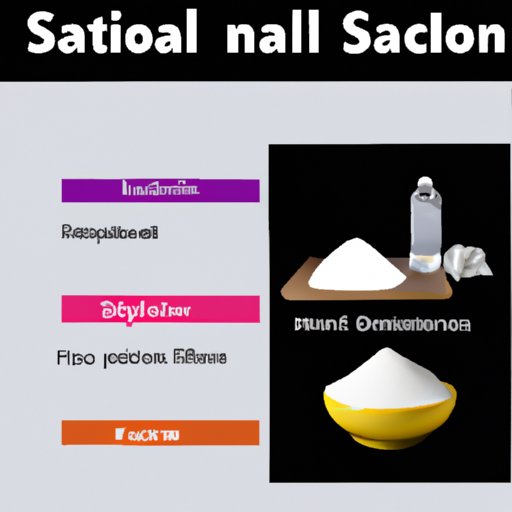
Properties and Uses of Sodium
Sodium is an essential mineral for human health and has several important functions in the body, including regulation of blood pressure, nerve impulse transmission, and fluid balance. It is also widely used in industrial processes, such as in the manufacture of glass and paper, and in the production of soaps and detergents. Additionally, sodium is used in the production of chlorine, which is an important component of many household products.
How Does Sodium Affect Our Health?
The role of sodium in human health is complex and can be both beneficial and detrimental depending on the amount consumed. Too much sodium can lead to high blood pressure, stroke, heart disease, and kidney problems, while too little can lead to muscle cramps, dizziness, and fatigue.
Role of Sodium in Regulation of Blood Pressure
Sodium plays an important role in regulating the body’s blood pressure. According to a study published in the journal Hypertension, “The primary mechanism for maintaining normal blood pressure involves the precise balance between sodium intake and excretion.” In other words, the body needs a certain amount of sodium in order to maintain healthy blood pressure levels.
Effects of High Sodium Levels
When sodium levels become too high, it can cause an increase in blood pressure, which can lead to serious health problems such as stroke, heart attack, and kidney failure. According to the American Heart Association, “Excess sodium increases the workload on your heart and blood vessels and increases your risk of high blood pressure, heart disease, and stroke.”
Low Sodium Diet Recommendations
In order to reduce the risk of developing high blood pressure and other health problems associated with excessive sodium intake, the American Heart Association recommends limiting sodium intake to less than 2,300 milligrams per day. For people with high blood pressure, the recommendation is even lower at 1,500 milligrams per day.

Exploring the Role of Sodium in Our Diet
In addition to its role in regulation of blood pressure, sodium is an important part of our diets for various reasons. It helps maintain fluid balance in the body and aids in the absorption of other nutrients such as calcium, magnesium, and potassium. It also plays a role in nerve impulse transmission and muscle contraction.
Recommended Daily Intake of Sodium
The recommended daily intake of sodium for adults is 2,300 milligrams per day, according to the Dietary Guidelines for Americans. This amount is equivalent to about one teaspoon of salt. The maximum recommended daily intake is 2,400 milligrams per day, which is the equivalent of one and a half teaspoons of salt.
Benefits of Consuming Sodium
Consuming the right amount of sodium is important for proper hydration, nerve impulse transmission, and muscle contraction. It also helps the body absorb other essential minerals, such as calcium and potassium. A study published in the journal Annals of Nutrition & Metabolism found that “adequate dietary sodium is necessary for optimal calcium absorption, and therefore for optimal bone health.”
Different Sources of Sodium
Sodium can be obtained from a variety of sources, including natural and processed foods. Natural sources include vegetables, fruits, dairy products, and seafood. Processed foods are often the biggest source of dietary sodium, as they tend to contain added salt or other preservatives. Common sources of sodium in processed foods include canned soups, sauces, and condiments, frozen meals, and snack foods.
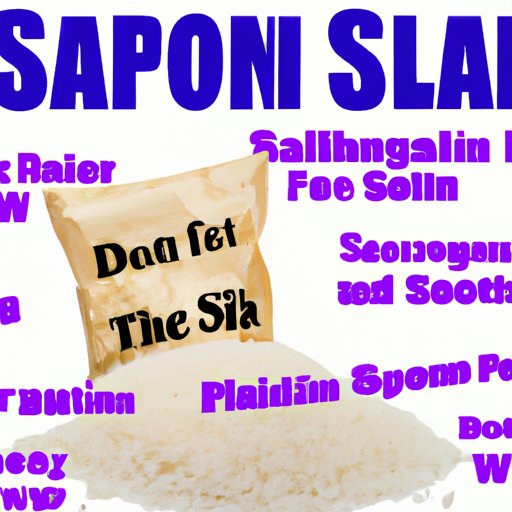
The Benefits and Risks of Consuming Sodium
Consuming the right amount of sodium can provide numerous health benefits, but it is important to be aware of the potential risks associated with excessive intake. For most people, consuming less than 2,300 milligrams of sodium per day is recommended to reduce the risk of developing high blood pressure, stroke, and other health problems. However, those with high blood pressure should limit their intake to 1,500 milligrams per day.
Health Benefits of Sodium
When consumed in moderation, sodium can provide numerous health benefits, including proper hydration, nerve impulse transmission, and muscle contraction. It also helps the body absorb important minerals, such as calcium and potassium, which are essential for strong bones and teeth. Additionally, sodium helps regulate blood pressure and prevents dehydration.
Potential Risks of Excessive Sodium Intake
While sodium is an essential mineral, consuming too much can have detrimental effects on health. Excessive sodium intake can lead to high blood pressure, stroke, heart attack, and kidney problems. It can also contribute to water retention, which can cause bloating and swelling. Therefore, it is important to consume sodium in moderation.
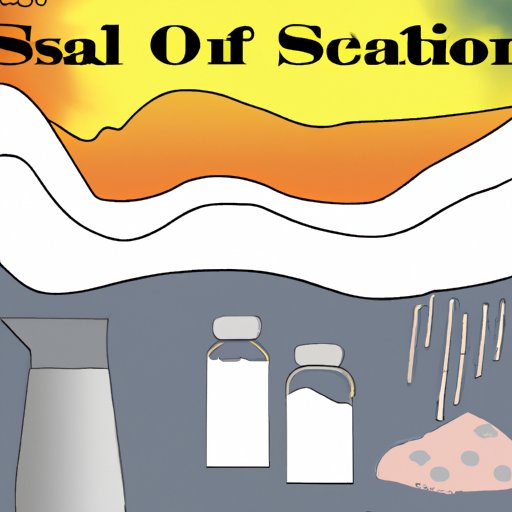
Examining the Sources of Sodium in Our Environment
Sodium is present in our environment in both natural and man-made forms. Natural sources include seawater, soil, and various types of rocks and minerals. Man-made sources include processed foods, which often contain added salt or other preservatives. Additionally, sodium is released into the environment through industrial processes, such as the production of chlorine.
Natural Sources of Sodium
Natural sources of sodium include seawater, soil, and various types of rocks and minerals. Seawater contains the highest concentration of sodium, while soil typically contains between 0.1% and 1% sodium. Rocks and minerals containing sodium include halite (rock salt), sylvite (potash), and natron (sodium carbonate).
Processed Foods Containing High Amounts of Sodium
Processed foods are the largest source of dietary sodium. Common sources of sodium in processed foods include canned soups, sauces, and condiments, frozen meals, and snack foods. These foods often contain added salt or other preservatives, which can significantly increase the sodium content.
Environmental Sources of Sodium
Sodium is also released into the environment through industrial processes, such as the production of chlorine. Chlorine is an important component of many household products, including bleach and toilet bowl cleaners. Additionally, sodium is released into the environment through the burning of fossil fuels and the disposal of waste products.
Conclusion
Sodium is an essential mineral that plays an important role in our diets, our environment, and our overall health. It helps regulate blood pressure, nerve impulse transmission, and fluid balance, and it aids in the absorption of other essential minerals. While excessive sodium intake can have negative health effects, consuming the right amount can provide numerous benefits. It is important to be aware of the different sources of sodium in our environment and to consume it in moderation in order to maintain optimal health.
Summary of Key Points
• Sodium is an essential mineral found in a variety of natural and man-made sources.
• It plays an important role in regulation of blood pressure, nerve impulse transmission, and fluid balance.
• The recommended daily intake of sodium for adults is 2,300 milligrams per day.
• Consuming the right amount of sodium can provide numerous health benefits, while excessive intake can lead to health problems such as high blood pressure, stroke, and kidney failure.
• It is important to be aware of the sources of sodium in our environment and to consume it in moderation in order to maintain optimal health.
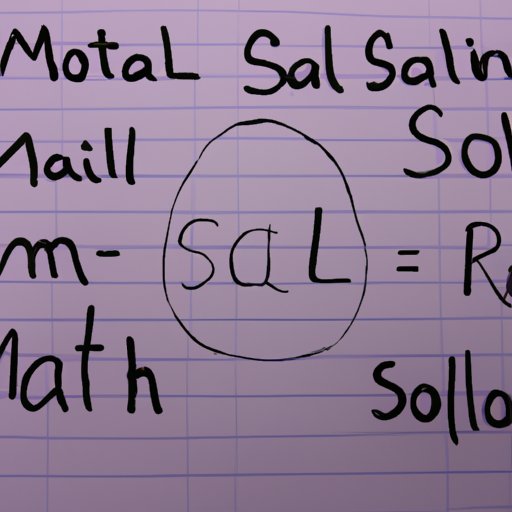
Final Thoughts on Sodium as a Mineral
Sodium is an essential mineral that plays an important role in our diets, our environment, and our overall health. It is important to be aware of the sources of sodium in our environment and to consume it in moderation in order to maintain optimal health. By understanding the benefits and risks associated with sodium, we can make informed decisions about our diets and our health.
(Note: Is this article not meeting your expectations? Do you have knowledge or insights to share? Unlock new opportunities and expand your reach by joining our authors team. Click Registration to join us and share your expertise with our readers.)
